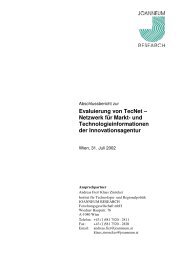23.11.2011 Ausgabe 36 - fteval
23.11.2011 Ausgabe 36 - fteval
23.11.2011 Ausgabe 36 - fteval
Sie wollen auch ein ePaper? Erhöhen Sie die Reichweite Ihrer Titel.
YUMPU macht aus Druck-PDFs automatisch weboptimierte ePaper, die Google liebt.
Introduction<br />
Grit Laudel and Jochen Gläser<br />
Academic careers and how to find research<br />
excellence<br />
It is difficult to find another work process as suffused with evaluations as research. Research uses scarce resources and<br />
produces results other researchers need to use and thus must be able to rely on. Consequently, researchers are evaluated<br />
when they start a project (trough the peer review of project grants), while they conduct it (through collaborations<br />
and informal communication), when they publish their results (through the peer review of their manuscripts), and when<br />
they apply for new jobs (through the peer review of applicants’ research performance). On average, a researcher can<br />
be assumed to undergo an evaluation at least every two months.<br />
These constant evaluations are esoteric and difficult to assess outside the scientific community that constitutes a<br />
researcher’s primary work context. Judgments are made implicitly and informally, or are formulated in a way that their<br />
meaning is fully accessible only to members of the same community. While there are events that are regarded as ‘success’<br />
or ‘failure’ by outsiders, those events are comparatively rare and are still open to interpretation. The constant<br />
evaluation of researchers is an inseparable part of an esoteric work process and thus difficult to understand.<br />
These evaluations have recently been topped by a new layer . Driven by the twin moves to more autonomy and more<br />
accountability, research organizations feel the need to improve their research performance. Improving research performance<br />
depends on knowing it, and knowing research performance requires evaluations. Thus, organizations have<br />
been establishing their own research performance evaluations of subunits and individuals. They ask for numbers of<br />
publications, indicators for the quality of publications, numbers and amounts of research grants, prizes and awards, and<br />
so on. Researchers begin to adapt to this new interest by proactively including the required information in their CVs,<br />
grant applications, and web pages.<br />
But do the indicators that are commonly used tell us anything about research performance at all? What aspects of<br />
performance, if any, do they measure? Can they, via researchers adapting to them, distort research and research<br />
performance? In this contribution, we discuss the uses of indicators that can be derived from researchers’ careers.<br />
We demonstrate that most of the simple indicators are close to useless, and understanding researchers’ performance<br />
requires a thorough study of their career.<br />
1. Which career?<br />
Both our everyday experience and organizational theory consider careers as happening within, and in some cases also<br />
between, organizations. Careers are seen as a sequence of moves between positions, and the major outcome of such<br />
moves is usually regarded as an increase in responsibilities, power, and income.<br />
3<br />
Nr. <strong>36</strong><br />
06/2011<br />
Researchers are different in that they have three careers at once. The first career is their research career, i.e. the sequence<br />
of interlinked projects they work on. These projects often build on each other, and each of them contributes to<br />
an academic’s perspective on what to do next as well as to the academic’s abilities to solve particular problems. They<br />
thus constitute a series of path dependent steps that is characteristic of careers (Barley 1989 ).<br />
Closely linked to this research career is an researcher’s community career. By ‘community career’ we mean the move of<br />
researchers between status positions in the social context that is crucial for their research (and much more important<br />
than their organization) - their scientific community. The scientific community is the social collective that produces<br />
scientific knowledge. Researchers derive their individual plans from their perception of the community’s shared knowledge,<br />
and offer their own contributions to that knowledge in publications. The scientific community is therefore an<br />
often invisible but nevertheless very powerful social context for researchers (Gläser 2006). Academics go through a<br />
status career in their scientific community that comprises distinct positions. We use ideas about professional careers<br />
(Dalton et al. 1977) to distinguish four stages of an academic’s community career (Gläser 2001: 703):<br />
1. An apprentice learns to conduct research while working under the direction of others. PhD students are apprentices,<br />
in some cases this stage may extend to early postdoctoral phases.<br />
2. A colleague conducts independent research, i.e. autonomously decides on problems to solve, on approaches to<br />
problem solving, and on ways to communicate results to the scientific community.<br />
3. A master additionally acts as a teacher of apprentices.<br />
4. A member of the elite additionally shapes the direction of the knowledge production of their community by excep-<br />
tional research contributions, by taking on influential roles in professional organizations, funding organizations, and<br />
other interfaces between science and society, and by informallysteering the community through elite networks<br />
(Laudel 2005a: 390).<br />
Most researchers – but not all of them - will reach the position of a colleague. Many will also reach the level at which<br />
they supervise PhD students, i.e. the master stage. The last stage of an elite member is of course achieved by only a<br />
handful of researchers.<br />
Finally, researchers also have a ‘conventional’ organisational career. Most current research would be impossible without<br />
organizations providing researchers with positions (and thus an income) and resources for their research. By moving<br />
between jobs offered by these organisations researchers go through an organisational career whose stages are linked<br />
to specific performance expectations and research opportunities.<br />
However, organizations can affect the directions and quality of research only indirectly. Decisions on research content<br />
are made by individual researchers in the context of their community. Organisations can therefore be best thought of as<br />
merely ‘hosting’ researchers who ‘rent’ places in organisations that provide them with income and resources. They use<br />
these opportunities to contribute to the knowledge of their community and ‘pay’ the organization with their reputation<br />
and contributions to other organizational tasks such as teaching (Clark 1983: 28-34; Sørensen 1992: 94-96). Another<br />
peculiarity of research organizations is that they offer little in terms of intraorganizational careers. Owing to the specialization<br />
of research communities, there are very few steps on the intraorganizational career ladder for researchers. It<br />
is impossible for an assistant professor in ancient history to move to the position of an associate professor in quantum<br />
physics that recently has become vacant at the same university. This is why there are only very few intraorganizational<br />
moves between positions, and why moves between organizations are relatively frequent.<br />
4<br />
Nr. <strong>36</strong><br />
06/2011


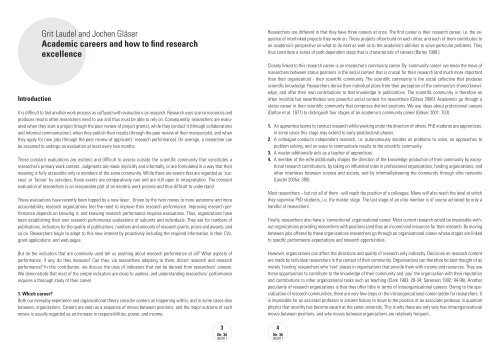

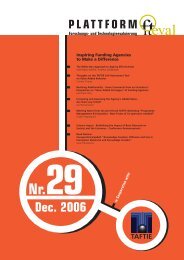
![roadMAP [PDF, 1.9 MB] - fteval](https://img.yumpu.com/21079876/1/184x260/roadmap-pdf-19-mb-fteval.jpg?quality=85)
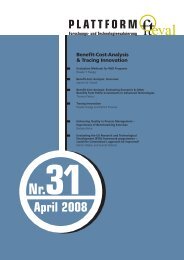
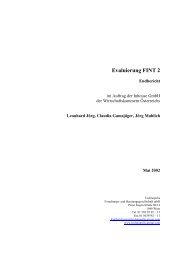
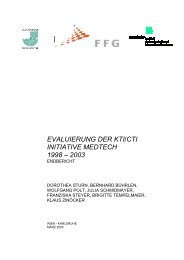
![GuggenbergeronBoku [PDF, 73.4 KB] - fteval](https://img.yumpu.com/21024081/1/184x260/guggenbergeronboku-pdf-734-kb-fteval.jpg?quality=85)
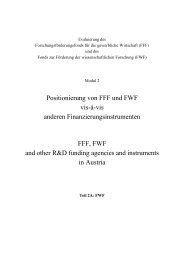
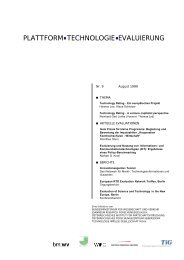
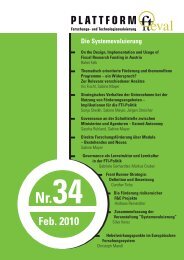
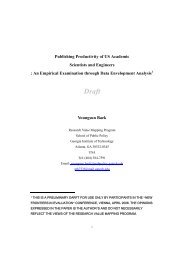
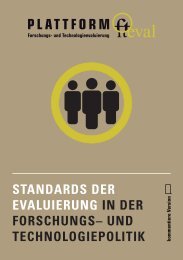
![ITF_Energietechnik [PDF, 39.6 KB] - fteval](https://img.yumpu.com/20959076/1/184x260/itf-energietechnik-pdf-396-kb-fteval.jpg?quality=85)
![Evaluation Standards [PDF, 120.8 KB] - fteval](https://img.yumpu.com/20931509/1/184x260/evaluation-standards-pdf-1208-kb-fteval.jpg?quality=85)
